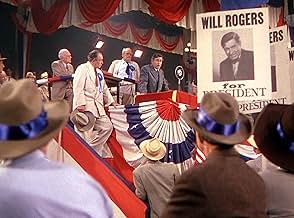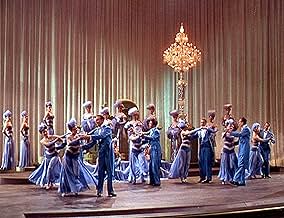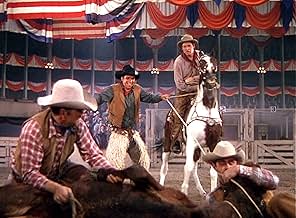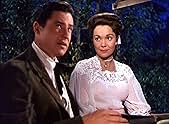Aggiungi una trama nella tua linguaThe homespun humorist and social critic starts as a cowboy and goes on to vaudeville, movies, and radio.The homespun humorist and social critic starts as a cowboy and goes on to vaudeville, movies, and radio.The homespun humorist and social critic starts as a cowboy and goes on to vaudeville, movies, and radio.
- Regia
- Sceneggiatura
- Star
Todd Karns
- 1st Mechanic
- (scene tagliate)
J. Carrol Naish
- Narrator
- (voce)
Dub Taylor
- Actor
- (scene tagliate)
Victor Adamson
- Townsman Greeting Will
- (non citato nei titoli originali)
Leon Alton
- Rodeo Spectator
- (non citato nei titoli originali)
Recensioni in evidenza
When they discuss the great movies of director Michael Curtiz, they start with Casablanca, which may well be the greatest American movie - for which he earned a well-deserved Oscar - and go on to such screen gems as The Adventures of Robin Hood, Captain Blood, The Sea Hawk, Yankee Doodle Dandy (which is a slow movie with a great performance by its star), Life with Father, and a host of others. I doubt anyone would think to mention this movie.
And The Story of Will Rogers is not a great movie. It does not move with the relentless drive of Casablanca or Robin Hood, it does not sparkle like Life with Father. Seventeen years after his untimely death in 1935, it tells the story of the then still well-remembered American humorist, Will Rogers. Since everyone still knew his story then, the movie did not have to tell it; rather, it picked the moments that it wanted to stand out.
That isn't Rogers' years in the Ziegfeld Follies, which made him a household word, or his appearance in movies, even through, for a short while, he was the biggest box office attraction in talkies.
Rather, it concentrates on Rogers' support of General William (Billy) Mitchell and his efforts to get Congress to put money into air power at a time when the U.S. was pulling back into isolationism. World War II and the terrifying German blitzkrieg would eventually show that Mitchell and Rogers were right.
It also concentrates, in the last part, on Rogers' fund raising for the poor during the depths of the Depression. That, too, is an aspect of Rogers' career that is probably forgotten today.
This movie won't keep you glued to your seat. But it does serve to remind us, now that there are few among us who remember seeing and hearing Rogers, what warm-hearted pleasure he brought to Americans when so many of us needed a smile so badly. His sense of humor may seem corny today - it was corny back then, too - but there is a lack of nastiness or derision to it that I often miss today.
And The Story of Will Rogers is not a great movie. It does not move with the relentless drive of Casablanca or Robin Hood, it does not sparkle like Life with Father. Seventeen years after his untimely death in 1935, it tells the story of the then still well-remembered American humorist, Will Rogers. Since everyone still knew his story then, the movie did not have to tell it; rather, it picked the moments that it wanted to stand out.
That isn't Rogers' years in the Ziegfeld Follies, which made him a household word, or his appearance in movies, even through, for a short while, he was the biggest box office attraction in talkies.
Rather, it concentrates on Rogers' support of General William (Billy) Mitchell and his efforts to get Congress to put money into air power at a time when the U.S. was pulling back into isolationism. World War II and the terrifying German blitzkrieg would eventually show that Mitchell and Rogers were right.
It also concentrates, in the last part, on Rogers' fund raising for the poor during the depths of the Depression. That, too, is an aspect of Rogers' career that is probably forgotten today.
This movie won't keep you glued to your seat. But it does serve to remind us, now that there are few among us who remember seeing and hearing Rogers, what warm-hearted pleasure he brought to Americans when so many of us needed a smile so badly. His sense of humor may seem corny today - it was corny back then, too - but there is a lack of nastiness or derision to it that I often miss today.
If The Story Of Will Rogers did not exactly stick close to the facts it certainly captured the spirit of the man who in his time was America's beloved entertainer. Will Rogers was in fact more than an entertainer, he was a shrewd and trenchant observer of the political and social scene. We could use a dose of his wisdom today.
Will Rogers, Jr., who as a dutiful son was the custodian of his father's legacy plays the role of his father and you'll swear it was the real Will. Of course one can see the real Will Rogers in any number of fine films he made for Fox. The film is based on his widow's memoirs and she is played by Jane Wyman so the Rogers family had a tight control on this one.
It was quite true that Rogers took a long time to find himself, he was something of a rebellious kid who did not take to school. Clem Rogers, his father is played by Carl Benton Reid and he was a power in the Cherokee Indian councils. All Will wanted to do was be a cowboy, but he had a knack for saying some real funny things off the cuff and eventually parlayed that into a vaudeville act and after that the Ziegfeld Follies and movies. And of course a newspaper column that a collection of will be a really shrewd observation of his times.
One thing that was a glaring error, Will Rogers was never put in nomination for president even as a favorite son. Governor William H. Murray of Oklahoma was in fact a presidential hopeful in 1932 and he would have been surprised at that turn of events.
Not to say that he wouldn't have made a good president. There is an underside to the Rogers legacy. The dark mirror image of Will Rogers who never met a man he didn't like is portrayed quite ably on the screen by Andy Griffith in A Face In The Crowd. Lonesome Rhodes would have said he never met a man he couldn't take.
One of the things that Rogers said that was quoted in this film was that this was the greatest country in the world, but taxes are the privilege you pay for living in it. I wish a lot more people would remember that today.
The Story Of Will Rogers and the films of Will Rogers provide an enduring legacy to a man who was a national treasure in his day and now.
Will Rogers, Jr., who as a dutiful son was the custodian of his father's legacy plays the role of his father and you'll swear it was the real Will. Of course one can see the real Will Rogers in any number of fine films he made for Fox. The film is based on his widow's memoirs and she is played by Jane Wyman so the Rogers family had a tight control on this one.
It was quite true that Rogers took a long time to find himself, he was something of a rebellious kid who did not take to school. Clem Rogers, his father is played by Carl Benton Reid and he was a power in the Cherokee Indian councils. All Will wanted to do was be a cowboy, but he had a knack for saying some real funny things off the cuff and eventually parlayed that into a vaudeville act and after that the Ziegfeld Follies and movies. And of course a newspaper column that a collection of will be a really shrewd observation of his times.
One thing that was a glaring error, Will Rogers was never put in nomination for president even as a favorite son. Governor William H. Murray of Oklahoma was in fact a presidential hopeful in 1932 and he would have been surprised at that turn of events.
Not to say that he wouldn't have made a good president. There is an underside to the Rogers legacy. The dark mirror image of Will Rogers who never met a man he didn't like is portrayed quite ably on the screen by Andy Griffith in A Face In The Crowd. Lonesome Rhodes would have said he never met a man he couldn't take.
One of the things that Rogers said that was quoted in this film was that this was the greatest country in the world, but taxes are the privilege you pay for living in it. I wish a lot more people would remember that today.
The Story Of Will Rogers and the films of Will Rogers provide an enduring legacy to a man who was a national treasure in his day and now.
This one is now out on DVD in the Warner Archives Collection. I saw this picture when it first came out - I was 11 at the time and I wanted to see if it held up in the ensuing 58 years, and I'm pleased to report it is just as entertaining and absorbing the second time around.
Such is not always the case. I did the same thing with "The High And The Mighty", and was disappointed at how trite and stagey the picture seemed when I saw it recently. But "Will Rogers" holds up, probably because it is a biography of a very famous American from the early part of the last century. Then as now, I was fascinated by what a dead ringer for his dad Will Rogers, Jr. was. I also think the movie benefited from a superior direction job.
Can I make one criticism? I didn't think Jane Wyman fit the part of a girlfriend/ wife from Oologah, Okla. She was too sophisticated, like a society chick from Riverside Drive who wouldn't bother with a bumpkin from Oologah. But that's just me.
In any case, this is worth buying and watching. I don't think it will be on TV any time soon as there are two scenes of Eddie Cantor and Al Jolson performing in blackface. Can't upset the PC crowd, you know.
Such is not always the case. I did the same thing with "The High And The Mighty", and was disappointed at how trite and stagey the picture seemed when I saw it recently. But "Will Rogers" holds up, probably because it is a biography of a very famous American from the early part of the last century. Then as now, I was fascinated by what a dead ringer for his dad Will Rogers, Jr. was. I also think the movie benefited from a superior direction job.
Can I make one criticism? I didn't think Jane Wyman fit the part of a girlfriend/ wife from Oologah, Okla. She was too sophisticated, like a society chick from Riverside Drive who wouldn't bother with a bumpkin from Oologah. But that's just me.
In any case, this is worth buying and watching. I don't think it will be on TV any time soon as there are two scenes of Eddie Cantor and Al Jolson performing in blackface. Can't upset the PC crowd, you know.
I agree with the previous commenter about how good this movie is and would love to see it available on video. This movie was made in 1952 and starred Will Rogers Jr. It showed Will Rogers Jr, as his father, doing some performance on Broadway as well as some of the fund-raisers he did during the depression and more of the movies he made in Hollywood. However this website is showing a picture of a movie made in 1961, narrated by Bob Hope, and it is NOT the same movie that they are describing. The one narrated by Bob Hope, is available on video (dvd), and although it is a good biographical movie of Will Rogers, it is NOT the one starring Will Rogers Jr, or any of the other stars listed on this web site. They need to remove that picture as it can cause some confusion for some people.
Will Rogers, Jr. stars as his own father Will Rogers in what many critics say is one of the best of movie biographies ever. Will, Jr. even asked that nothing be added to over-dramatize or embellish the storyline of the movie. He wanted his father to speak for himself. That's what they said on TCM. If you love film biographies, or like Jane Wyman, or if you have never heard of Will Rogers and want to know more about him, then you're in for a treat. Costarring James Gleason, Slim Pickens, Mary Wickes and Eddie Cantor as himself, this film has more heart and respect for its subject matter in one minute, than a lot of other movie biographies have in the whole film, especially musical biographies. This film shows how one man made a difference in the lives of others by being himself and that he is still being loved and remembered today.
Lo sapevi?
- QuizThe real Eddie Cantor appears as himself in support of Will Rogers, Jr. who portrays his father, a contemporary of Cantor's. The next year Rogers, Jr. would return the favor, again appearing as his father in The Eddie Cantor Story. Both films were made by Warner Brothers.
- BlooperWhen Will Rogers is addressing the bankers at 1:17:00 in, there are 2 old style microphones on the table in front of him. The one on the left of the screen, Rogers' right, is missing one of the suspension springs between the mic cartridge and the frame. It also has no wire attached to it, so it couldn't possibly function.
- Citazioni
Will Rogers: Well it looks like the women are finally gonna get the vote. A lot of men say they shouldn't be trusted with it. Seems kind of silly to stop trustin' them now after eatin' their cookin' for 4000 years.
- ConnessioniEdited from Rapsodia in blu (1945)
- Colonne sonoreHome on the Range
(uncredited)
Music by Daniel E. Kelley
Lyrics by Brewster M. Higley
Played at the beginning and during the opening credits
Sung at the Rogers party and used often in the score
I più visti
Accedi per valutare e creare un elenco di titoli salvati per ottenere consigli personalizzati
Dettagli
- Data di uscita
- Paese di origine
- Lingua
- Celebre anche come
- Historia Willa Rogersa
- Luoghi delle riprese
- Azienda produttrice
- Vedi altri crediti dell’azienda su IMDbPro
- Tempo di esecuzione1 ora 49 minuti
- Proporzioni
- 1.37 : 1
Contribuisci a questa pagina
Suggerisci una modifica o aggiungi i contenuti mancanti

Divario superiore
By what name was The Story of Will Rogers (1952) officially released in India in English?
Rispondi


































